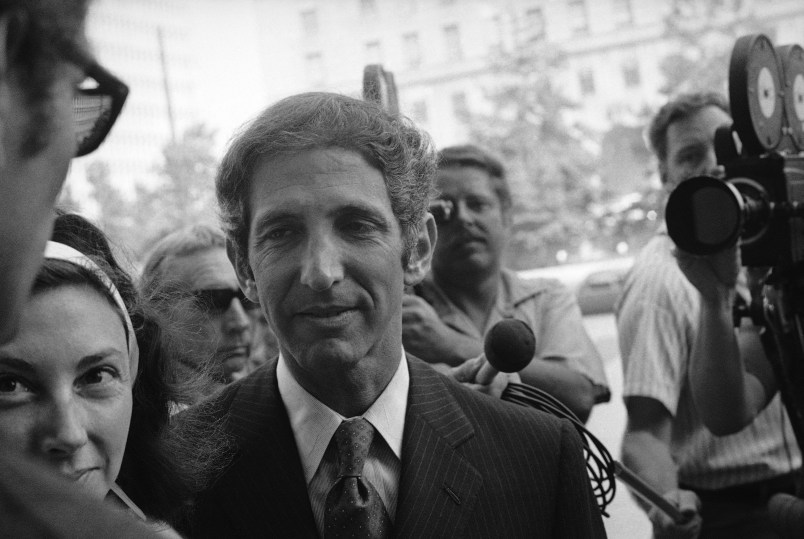At the center of the ongoing lawsuit between House Republicans and the Securities and Exchange Commission over subpoenas for a House committee and a congressional aide is the Constitution’s separation of powers. And the key to unlocking that dispute — whether the House must comply with subpoenas from the executive branch — might be a 1971 Supreme Court case involving the Pentagon Papers leaked by Daniel Ellsberg (pictured).
The aide, Brian Sutter, and the House Ways and Means Committee have been sued by the SEC to force them to comply with a subpoena issued as part of an investigation into the leak of non-public information to Wall Street back in April 2013. The leak, about an imminent policy change to Medicare, resulted in significant trading for some health care companies, which were about to benefit from a reversal in proposed funding cuts. A federal grand jury in New York is also investigating the leak.
The lawsuit, in which the SEC alleged Sutter “may have been” the source of the leak, followed the refusal of Sutter and the committee to comply. The counsel’s office for the House, which is representing Sutter and the committee, told TPM earlier this week that the subpoenas “run seriously afoul of the Constitution’s Speech or Debate Clause, and we expect to respond in due course on that ground, among others.”
Generally speaking, the Speech or Debate clause, found in Article I of the Constitution, protects members of Congress from being prosecuted for their official work, except in extreme circumstances. It is a core element of the Constitution’s separation of powers doctrine.
Sutter’s lawyers have invoked it to protect him and the committee from the subpoenas. The SEC has disagreed. The key to resolving that dispute likely lies in Gravel v. United States, a 1971 case that went before the Supreme Court as part of the Pentagon Papers drama.
Michael Stern, who served as House counsel from 1996 to 2004, told TPM that Gravel could be the most important legal precedent, particularly as it pertains to Sutter, as the House and SEC move forward.
“The general rule is that things that are internal to Congress are going to be protected,” he said. “But communications to the outside world are generally not going to be protected.”
The case concerned a federal subpoena that was issued to one of then-Sen. Mike Gravel’s aides, probing his role in acquiring and publishing the Pentagon Papers. Gravel had published the documents, which detailed previously unknown U.S. activities during the Vietnam War, in the Senate record after initial reports on them appeared in the New York Times.
After his aide was subpoenaed by a federal grand jury investigating the leak, Gravel sued to stop it on Speech or Debate grounds. The case made its way to the Supreme Court, and the Court sided with Gravel. As Oyez.org summarized the ruling:
The Court held that because the work of aides was critical to the performance of legislative tasks and duties, they were nothing less than legislators’ “alter egos” and thus immune from subpoenas by the Speech and Debate Clause. Aides were exempted from grand jury questioning so long as Senators invoked the privilege on their behalf.
Now the two sides seem set to contend whether that ruling protects Sutter and the committee from the SEC subpoenas. The SEC investigation is based on a suspected violation of the Stop Trading on Congressional Knowledge Act, the 2012 law which set limits for what non-public information Congress members and their aides could share that might move the stock markets.
The SEC lawyers cite Gravel five times in their argument that Sutter and the committee should be required to comply. They seized on the exception in the Court’s ruling: Though the Speech or Debate clause does apply to the legislative sphere, “it does not privilege either Senator or aide to violate an otherwise valid criminal law in preparing for or implementing legislative acts.” The Court also made a distinction between official legislative acts, like reading the papers into the congressional record, and non-legislative acts, like Gravel’s supplying them to a newspaper for publication.
Those key exceptions are also why the Speech or Debate clause has frequently appeared in recent criminal cases involving members of Congress, including the Jack Abramoff scandal, the raid on the Capitol Hill office of then-Rep. William Jefferson (D-LA), and the conviction of former Rep. Rick Renzi (R-AZ) on corruption charges.
A number of members of Congress subpoenaed as part of the Abramoff investigation invoked the clause. Jefferson’s lawyers argued that the 2006 raid on his office violated the clause, and a U.S. Court of Appeals rejected Renzi’s conviction appeals, saying the clause did not make members “supercitizens.”
It will be one of the big issues that House lawyers will likely have to address in their next filing in the SEC case, due July 4.







The laws don’t pertain to me! IYOKYAR or something.
“The SEC investigation is based on a suspected violation of the Stop Trading on Congressional Knowledge Act, the 2012 law which set limits for what non-public information Congress members and their aides could share that might move the stock markets.”
Of course this did little to stop the insider trading by those in the echelons of the legislative, judicial and executive tiers of our government. The corruption just continues on as the recipients of “non-public information” enrich themselves and their cohorts. Then proceed to weasel out of any incrimination as they get support from he millionaires club of Congress.
When, oh, when will John Boehner pontificate on the illegal behavior of the House?
This is just a distraction from Benghazi.
Or something.
Pretty simple.
Talk about it amongst yourselves, including arguing and debate —> No Problem.
Talk about it to others so they can profit from news before it’s actually news ----> Problem!
Whoops, we’re talking about the GOP here, and it’s always about how to make money for self. Sorry, I forgot the Prime Directive.